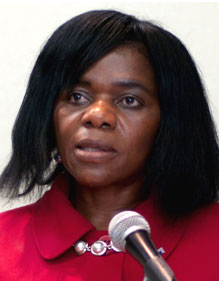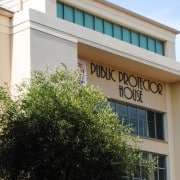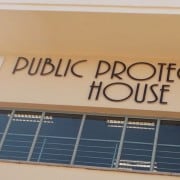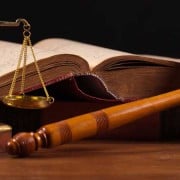|
Getting your Trinity Audio player ready...
|
 Source: Public protector
Source: Public protector
The public protector, Advocate Thuli Madonsela, has called on citizens to help protect South Africa’s constitutional democracy, arguing that in such a democracy, as opposed to a parliamentary democracy, the final say lies with the courts and ultimately the Constitutional Court.
She was delivering the ninth annual Peace, Safety and Human Rights Memorial Lecture which honoured the legacies of the late minister Abdullah “Dullah” Omar and Johannes “Joe” Moabi, hosted by the University of South Africa at its Florida Campus on 10 May. The lecture carried the theme Citizenship and Protection of South Africa’s Constitutional Democracy.
The public protector cited a Supreme Court of Appeal judgement, which held that: “The Republic of South Africa is a constitutional state. Local and other state institutions may act only in accordance with powers conferred on them by the law. This is the principle of legality, an incident of the rule of law.”
She also referred to a Constitutional Court decision handed down by Justice Sandile Ngcobo, wherein he said: “The exercise of public power must therefore comply with the Constitution, which is the supreme law, and the doctrine of legality, which is part of that law … It entails that both the legislature and the executive are constrained in the principle that they may exercise no power and perform no function beyond that conferred upon them by the law.”
Madonsela explained that, in parliamentary democracies, parliaments had the final say. However, in constitutional democracies such as South Africa, Parliament could speak and if its view was inconsistent with the Constitution, a court of law could intervene.
She said through participation in free and fair elections, a hallmark of democracy, citizens elected among themselves representatives they trusted enough to surrender their own power and collective resources, thereby allowing those elected to manage such power and resources on behalf of the electorate.
“Such powers and resources are entrusted on the basis of good faith, with the understanding that both the exercise of public power and control over the collective resources will be done within the parameters of the terms on which such power has been granted and in the best interest of the citizens,” she said.
In other words, she explained, state actors could not do things because they felt such things needed to or must be done. If a need was identified, a law needed to be created and debated transparently before a right to do what was identified as a need could be given.
Scrutinising the exercise of state power from an administrative point of view
Madonsela referred to former president Nelson Mandela’s remarks in one of his speeches, which suggested that South Africa’s constitutional democracy often had to be protected from actions in government or organs of state. She made an example of the Treatment Action Campaign case, where the court overruled the executive on the provision of anti-retroviral drugs, leading to the saving of lives.
The history of democracy from separation of powers to diffused state power, she said, told a story of state actors who tended to abuse their power or even, as indicated in the court cases referred to above, acting ultra vires or beyond their powers.
The public protector said her office was part of the new set of institutions introduced in modern democracies such as South Africa to strengthen constitutional democracy.
“Instead of judicial scrutiny, [the public protector’s] job is to scrutinise the exercise of state power from the administrative point of view,” she explained. “Former president Mandela recognised the powers of these institutions and he mentioned them by name – the public protector, the Human Rights Commission, the auditor-general, the Independent Electoral Commission, the Commission for Gender Equality and others.”
Madonsela added that the purpose of constitutional democracy in South Africa was to deliver the constitutional promise of providing an improved quality of life with a freed potential of every person, marked by equal enjoyment of all human rights and freedoms.
In strengthening, safeguarding and protecting constitutional democracy, she said, there was a hierarchy of scrutiny. The first level of scrutiny was self-imposed, where those exercising public power and control over state resources would be honouring the trust placed upon them by the people.
The second level of scrutiny was administrative and provided by internal institutions such as the Special Investigating Unit while, externally, there were independent constitutional bodies that were not part of the executive and reported on their activities to Parliament. Such bodies, which include her office, could not be dictated to by the executive and could not be second-guessed by the legislature.
Society must play a role in protecting constitutional democracy
In honouring the late Dullah Omar and Johannes Moabi, the public protector said it would have pleased Omar to be honoured together with Moabi, who equally fought for a democratic and exclusive South Africa.
She added that Omar was a quintessential human rights activist and a great human being who gave all he had to ensure human rights and access to justice for everyone. She recalled that he was one of those that advised President Mandela regarding compliance with the decisions of courts and Chapter 9 institutions.
“I do not recall Minister Omar advising any president that a task team has the same authority as a constitutional institution since he believed constitutional democracy was important for peace and stability in our country and the world because we have become a global village,” she said.
“I recall one of the things he used to talk about was that the justice system would never be respected or considered legitimate by the average person until the system achieves a situation where every person enjoys the right to understand and be understood.”
Madonsela ended the lecture with a call on society to play a role in protecting constitutional democracy. She called for a collective sharing of constitutional education to help others understand that there were constitutionally-provided mechanisms to raise grievances before taking to the streets.
She further advised public figures to watch what they said about institutions supporting democracy, because if they make persistent announcements that give people cause to doubt the authority and legitimacy of these institutions, it will increase the possibility of people taking to the streets when they were not happy with how the state advanced their human rights.








